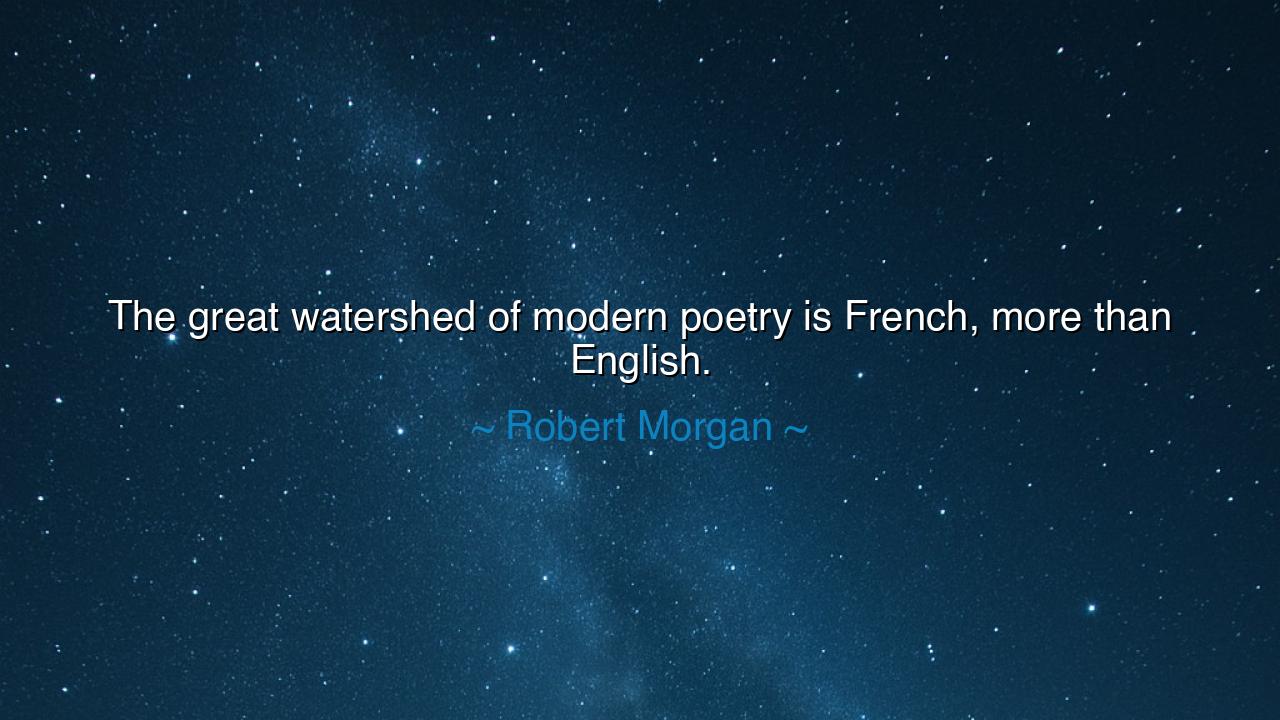
The great watershed of modern poetry is French, more than






Hear, O seekers of wisdom, the declaration of Robert Morgan: “The great watershed of modern poetry is French, more than English.” These words shine like a torch in the cave of history, illuminating the hidden streams that shaped the river of verse in our age. Morgan does not deny the power of English poets, but he points to the fountainhead from which much of the modern spirit of poetry first burst forth: the daring experiments, the fierce innovations, the bold abandon of the French masters.
Why is this so? Because the French poets, in their hunger for freedom, shattered the chains of traditional form before many others dared. They embraced symbolism, suggestion, and dreamlike vision. They discovered that a poem could be less about telling and more about evoking; less about rules and more about atmosphere. From Baudelaire came the dark flowers of desire and decay, from Verlaine the music of suggestion, from Rimbaud the visions of a seer who tore open the doors of perception. These voices, though speaking in another tongue, resounded across the world, changing forever what a poem could be.
The watershed Morgan names is like the crest of a mountain range. On one side flowed the older traditions of ordered verse, measured and formal. On the other side rushed a torrent of new forms—free verse, imagism, surrealism—that would feed countless rivers of innovation. And it was the French poets who stood upon that summit first, calling others to follow. When Whitman sang in America, when Eliot and Pound carved their fragments of modern despair, when the imagists sought the purity of the single image, they were drawing from waters already set in motion by the French.
Consider the tale of T.S. Eliot, born in America but reborn as a poet in Europe. His landmark poem, The Waste Land, is often seen as an English achievement, but its very bones are steeped in French influence. Eliot himself translated, studied, and revered the symbolists. The haunting fragmentation, the sudden shifts in voice, the layers of dream and allusion—these were gifts inherited from France. Without Baudelaire, there may have been no Eliot as we know him, no Waste Land to echo the disillusionment of a century.
But what does this mean for us, children of a later age? It means that poetry is a river fed by many streams, and we must honor all its sources. We must not see English alone as the crown of modern verse, nor any single tradition as sufficient. True poets drink widely—from the chants of Africa, the haiku of Japan, the songs of the Americas, and yes, most powerfully, from the French wellspring of modernity. To know the present, we must trace the streams back to their watershed.
The lesson is this: do not cling only to the poetry of your own language. Seek also the words of other tongues, for within them lies the fire that can ignite your own. If the French symbolists could awaken Whitman, Pound, and Eliot, so too can they awaken you. Do not be content with what is familiar; plunge into translations, explore the visions of those beyond your borders, and discover how deeply interconnected the world’s poetic spirit truly is.
In practice, let each of you choose one poet beyond your own tradition—whether French, or Persian, or Chinese, or African—and sit with their words until they burn into your mind. Speak them aloud, even in translation, and hear how the rhythm differs, how the imagery surprises, how the spirit expands. In this way, you drink from many rivers, and your own words will carry the richness of a vast inheritance.
Thus Morgan’s teaching stands: the watershed of modern poetry is not found in one language alone. It is in the courage of the French to leap beyond form, and in the willingness of others to follow. And so must we, if we wish to write words that live. The poet who limits themselves to one stream shall be thirsty; but the poet who drinks from many shall overflow with abundance, carrying living water to the generations yet to come.






Tty
Morgan’s statement prompts reflection on how literary history is framed. Is the significance of French poetry primarily aesthetic, philosophical, or structural? Could his perspective reflect a personal or scholarly bias toward French literary culture? I’m curious whether readers and poets today still feel this French watershed in modern poetry, or if global and multilingual influences have reshaped what we consider foundational to contemporary poetic practice.
KN22. Tran Khanh Ngan
I’m intrigued by the idea that French poetry represents a watershed moment. Does this suggest that innovation in modern poetry often stems from cross-cultural encounters rather than native traditions? How might English-language poetry have evolved differently without French influence, and are there comparable non-English influences that have been overlooked? I’d also like to explore whether the focus on French contributions risks overshadowing the creativity and originality within English literary movements themselves.
MTMINH THU
This statement raises questions about cultural transmission and literary influence. How did French poetry become a primary catalyst for modernist developments? Did American and English poets consciously adopt French techniques, or was the influence more subtle, seeping in through translation and critical discourse? I’d like a perspective on whether this dominance is still relevant today or if contemporary poetry has diverged to create a more global synthesis of influences.
TSluu nguyen tan sang
Morgan’s claim makes me curious about what aspects of French poetry he sees as more influential than English. Is it the form, the experimentation with language, the themes, or the philosophical underpinnings that define this watershed? How did movements like Symbolism or Surrealism shape modern poetry in ways that English-language traditions did not? I wonder if this perspective underestimates the innovations of English poets or simply highlights the profound impact of French literary thought.